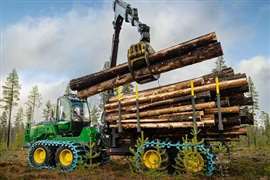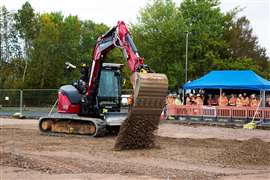Read this article in 中文 Français Deutsch Italiano Português Español
bp invests in U.S. biofuels developer
06 July 2023
bp ventures, the corporate venture capital arm of bp, has invested $10 million in California-based WasteFuel, a biofuels company that plans to use scalable anaerobic digestion and methanol production technologies to convert bio-based municipal and agricultural waste into lower carbon fuels, like bio-methanol. WasteFuel intends to develop a global network of plants, with the investment by bp – which led the Series B investment round – enabling the company to advance plans to develop its first plant in the UAE.
 The investment from bp ventures in WasteFuel will help scale the production of bio-methanol to decarbonize the shipping sector. (Photo: bp)
The investment from bp ventures in WasteFuel will help scale the production of bio-methanol to decarbonize the shipping sector. (Photo: bp)
According to bp, bio-methanol has potential to play a significant role in decarbonization of hard-to-abate sectors, including shipping. In the effort to reach net zero, some of the biggest companies in the shipping industry are converting to methanol-ready ships. As such, bp is working to establish supplies of lower carbon alternative fuels for the shipping sector and will look to use its trading expertise to bring WasteFuel’s bio-methanol to market, the company indicated.
“This investment from bp ventures is a significant milestone for WasteFuel as it will help scale the production of bio-methanol to decarbonize the shipping sector,” said Trevor Neilson, co-founder, chairman and CEO of WasteFuel. “As companies who are reliant on shipping work to reduce their greenhouse gas emissions, it is essential that we dramatically expand the availability of these fuels.”
WasteFuel’s plan includes collaborating with local strategic partners, including waste companies, as it establishes multiple bio-methanol plants globally, with its first project expected to be in Dubai. WasteFuel and bp have entered a memorandum of understanding for bp to offtake the bio-methane produced at the facility and work together to help optimize and improve its production.
Philipp Schoelzel, vice president of next generation biofuels at bp, sees this partnership helping to support the shipping industry’s decarbonization. “bp is in action to produce more biofuels, aiming to deliver around 100,000 barrels per day by 2030, to help decarbonize transport,” he said. “Investments like this are important as we strive to reach net zero and help our customers decarbonize, too.”
Globally, solid waste production totals about 2 billion metric tons annually and is expected to increase to 3.4 billion metric tons by 2050, per World Bank Trends in Solid Waste Management (worldbank.org). WasteFuel’s waste-to-bio-methanol plants will help with the growing volumes of global waste, while advancing development of lower carbon solutions for hard-to-abate sectors, said Gareth Burns, vice president, bp ventures.
“Achieving decarbonization in shipping will require a step-change, and biofuels have a key role to play in helping the industry to decarbonize,” he said. “We look forward to working together on WasteFuel’s next stage of growth and market development.”
POWER SOURCING GUIDE
The trusted reference and buyer’s guide for 83 years
The original “desktop search engine,” guiding nearly 10,000 users in more than 90 countries it is the primary reference for specifications and details on all the components that go into engine systems.
Visit Now
STAY CONNECTED




Receive the information you need when you need it through our world-leading magazines, newsletters and daily briefings.
CONNECT WITH THE TEAM













